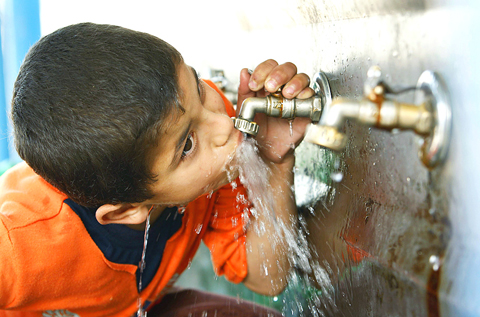Amnesty International is accusing Israel of pumping disproportionate amounts of drinking water from an aquifer it controls in the West Bank, depriving local Palestinians of their fair share.
The London-based human rights group also said in a report released yesterday that Israel has blocked infrastructure projects that would improve existing water supplies to Palestinians — both in the West Bank and those living in the Gaza Strip.
“This scarcity has affected every walk of life for Palestinians,” Amnesty’s researcher on Israel, Donatella Rovera, said in an interview on Monday ahead of the report’s release. “A greater amount of water has to be granted to them.”

PHOTO: REUTERS
Israeli officials rebutted the accusations.
Water is a major point of contention between Israelis and Palestinians and is considered an issue that must be resolved before the two sides could make peace.
The issue is further compounded by the split in Palestinian territories, with the moderate Fatah movement governing the West Bank, while the militant Hamas rules the coastal Gaza Strip.
Israelis use more than four times the amount of water per person on average than do Palestinians, whose consumption falls far below the minimum amount recommended by the WHO, the report said.
The report focuses on the Mountain Aquifer in the West Bank. It says that Israel uses more than 80 percent of water drawn from the aquifer, and while the Jewish state has other water sources, the aquifer is the West Bank’s sole supply.
As a result, the 450,000 Israelis who live in the West Bank and east Jerusalem use more water than the 2.3 million Palestinian residents, Amnesty said.
Israeli government spokesman Mark Regev called Amnesty’s claims “completely ludicrous,” and said Israel holds the legal right to the aquifer since it was the first to discover, develop and pump from it.
Regev said Israel pumps less water from the Mountain Aquifer today than it did in 1967 and Palestinian consumption of fresh water has actually tripled in that time.
He blamed the Palestinians for not investing in development in the West Bank and said they have failed even to drill wells that have already been approved.
Amnesty charged that Israel routinely denies Palestinians permits to launch desperately needed water sanitation and infrastructure projects in the West Bank.
Shaul Arlosoroff, a leading Israeli authority on water acquisition and use, said Israeli restrictions in the West Bank are meant to protect an already taxed aquifer from overpumping.
Amnesty also cited serious problems with water supply to the Gaza Strip.
Since Hamas seized control of the coastal territory in 2007, Gaza’s long-standing problems with sewage and water sanitation facilities have deteriorated, Rovera said. During Israel’s offensive in Gaza last year, water and sewage pipes suffered severe damage.
Rovera said the water situation in Gaza had reached a “crisis point,” with 90 percent to 95 percent of the water supply contaminated and unfit for human consumption.
An Israeli blockade of Gaza has halted any repairs to the strip’s overburdened sewage and water networks, preventing materials and equipment to repair the infrastructure from getting in, Rovera said.

In the sweltering streets of Jakarta, buskers carry towering, hollow puppets and pass around a bucket for donations. Now, they fear becoming outlaws. City authorities said they would crack down on use of the sacred ondel-ondel puppets, which can stand as tall as a truck, and they are drafting legislation to remove what they view as a street nuisance. Performances featuring the puppets — originally used by Jakarta’s Betawi people to ward off evil spirits — would be allowed only at set events. The ban could leave many ondel-ondel buskers in Jakarta jobless. “I am confused and anxious. I fear getting raided or even

Kemal Ozdemir looked up at the bare peaks of Mount Cilo in Turkey’s Kurdish majority southeast. “There were glaciers 10 years ago,” he recalled under a cloudless sky. A mountain guide for 15 years, Ozdemir then turned toward the torrent carrying dozens of blocks of ice below a slope covered with grass and rocks — a sign of glacier loss being exacerbated by global warming. “You can see that there are quite a few pieces of glacier in the water right now ... the reason why the waterfalls flow lushly actually shows us how fast the ice is melting,” he said.

Eleven people, including a former minister, were arrested in Serbia on Friday over a train station disaster in which 16 people died. The concrete canopy of the newly renovated station in the northern city of Novi Sad collapsed on Nov. 1, 2024 in a disaster widely blamed on corruption and poor oversight. It sparked a wave of student-led protests and led to the resignation of then-Serbian prime minister Milos Vucevic and the fall of his government. The public prosecutor’s office in Novi Sad opened an investigation into the accident and deaths. In February, the public prosecutor’s office for organized crime opened another probe into

RISING RACISM: A Japanese group called on China to assure safety in the country, while the Chinese embassy in Tokyo urged action against a ‘surge in xenophobia’ A Japanese woman living in China was attacked and injured by a man in a subway station in Suzhou, China, Japanese media said, hours after two Chinese men were seriously injured in violence in Tokyo. The attacks on Thursday raised concern about xenophobic sentiment in China and Japan that have been blamed for assaults in both countries. It was the third attack involving Japanese living in China since last year. In the two previous cases in China, Chinese authorities have insisted they were isolated incidents. Japanese broadcaster NHK did not identify the woman injured in Suzhou by name, but, citing the Japanese